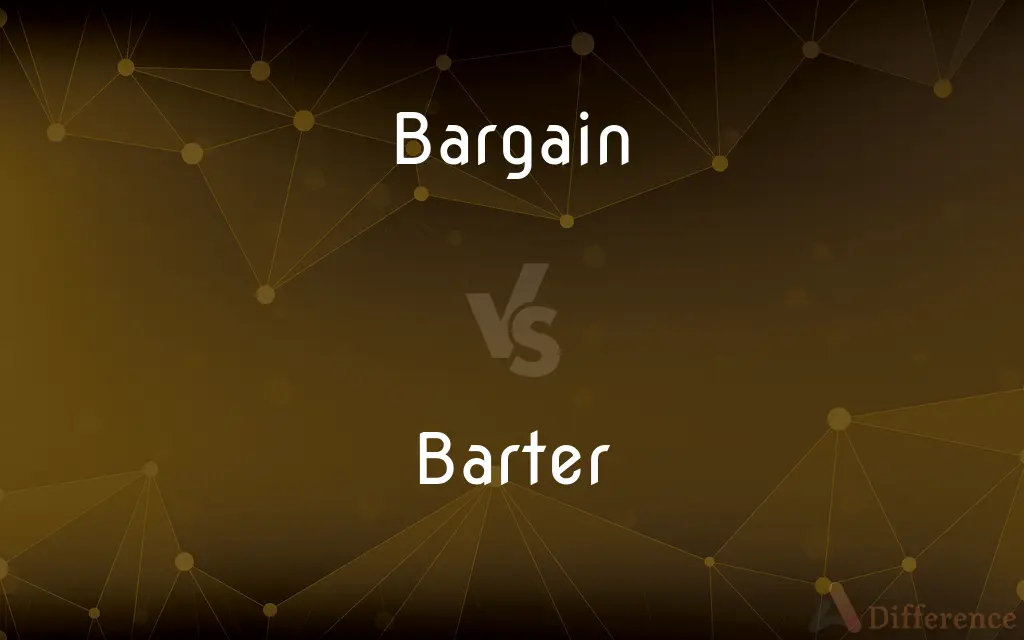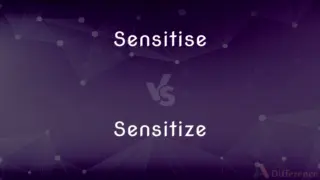Bargain vs. Barter — What's the Difference?
By Tayyaba Rehman — Updated on October 16, 2023
Bargain refers to negotiating a deal or price, while barter involves trading goods or services without using money.

Difference Between Bargain and Barter
Table of Contents
ADVERTISEMENT
Key Differences
Bargain and Barter are both terms related to transactions, but they address different aspects of the trading process. When someone bargains, they are negotiating the terms of a deal, often concerning the price. This act is prevalent in markets where the price isn't fixed. On the other hand, barter refers to a system of exchange where goods or services are directly exchanged for other goods or services, with no monetary involvement.
In bargaining, one party might start with a high price, expecting the other party to negotiate downwards. It's a dance of offers and counteroffers until both parties agree on a mutually acceptable price. Barter, however, harks back to a time before currency was the primary means of transaction. Here, if one person had grains and needed pottery, they would seek someone with pottery but needing grains. An agreement would be reached on the number of pots equivalent to a bushel of grains.
While the act of bargaining is alive and well in modern times, especially in local markets or in cultures where haggling is the norm, bartering is less common, primarily because of the convenience and universal acceptance of currency. However, in certain situations or communities where cash is less prevalent, barter can still be an essential method of trade.
Today's digital age has seen a slight resurgence of bartering, with online platforms emerging to facilitate the direct exchange of services. For example, a graphic designer might design a logo in exchange for website hosting services. Bargaining, meanwhile, remains a fixture in both physical stores and online marketplaces, where buyers and sellers negotiate to settle on a price.
Comparison Chart
Nature
Negotiation over price or terms
Exchange of goods/services without money
ADVERTISEMENT
Involvement of Money
Can involve money, but not always
Does not involve money
Modern Usage
Common, especially in markets
Less common, but seen in specific contexts
Historical Relevance
Has always been a part of trade
Pre-dates the use of currency
Application in Digital Age
Common in online marketplaces
Exists on specific platforms or communities
Compare with Definitions
Bargain
An agreement between parties regarding a transaction.
We struck a bargain for the antique vase.
Barter
Trade in which goods or services are exchanged without using money.
In ancient times, people would barter for essential goods.
Bargain
Something advantageous acquired through negotiation.
The extra warranty was a good bargain.
Barter
An act of exchanging items of equal perceived value.
She would barter fresh eggs for homemade bread.
Bargain
The act of negotiating the terms of a deal.
After a long bargain, they settled on a fair price.
Barter
The direct exchange of goods for goods.
He wanted to barter his old guitar for a saxophone.
Bargain
An agreement between parties fixing obligations that each promises to carry out.
Barter
A non-monetary method of obtaining what one needs.
With no cash on hand, they had to barter for their supplies.
Bargain
An agreement establishing the terms of a sale or exchange of goods or services
Reached a bargain with the antique dealer over the lamp.
Barter
A system of trade used before the invention of currency.
Some tribes still use barter as their primary form of trade.
Bargain
Property acquired or services rendered as a result of such an agreement.
Barter
In trade, barter (derived from baretor) is a system of exchange in which participants in a transaction directly exchange goods or services for other goods or services without using a medium of exchange, such as money. Economists distinguish barter from gift economies in many ways; barter, for example, features immediate reciprocal exchange, not one delayed in time.
Bargain
Something offered or acquired at a price advantageous to the buyer
That silk dress is a bargain at that price.
Barter
Exchange (goods or services) for other goods or services without using money
He often bartered a meal for drawings
They were able to buy or barter for most of what they needed
Bargain
To negotiate the terms of an agreement, as to sell or exchange.
Barter
The action or system of bartering
Paper money ceases to have any value and people resort to barter
Bargain
To engage in collective bargaining.
Barter
To trade goods or services without the exchange of money.
Bargain
To arrive at an agreement.
Barter
To trade (goods or services) without the exchange of money.
Bargain
To exchange; trade
Bargained my watch for a meal.
Barter
The act or practice of bartering.
Bargain
An agreement between parties concerning the sale of property; or a contract by which one party binds himself to transfer the right to some property for a consideration, and the other party binds himself to receive the property and pay the consideration.
Barter
Something bartered.
Bargain
An agreement or stipulation; mutual pledge.
Barter
Of, relating to, or being something based on bartering
A barter economy.
Bargain
An item purchased for significantly less than the usual, or recommended, price
Barter
An exchange of goods or services without the use of money.
We had no money so we had to live by barter.
Bargain
A gainful transaction; an advantageous purchase.
To buy a thing at a bargain
At that price, it's not just a bargain, it's a steal.
Barter
The goods or services used in such an exchange.
The man used his watch as barter to pay for his tab.
Bargain
The thing stipulated or purchased.
Barter
(ambitransitive) To exchange goods or services without involving money.
She bartered a bonsai for one of the rare books in my library.
You may be able to barter for some of the items you need at the local market.
Bargain
(intransitive) To make a bargain; to make a deal or contract for the exchange of property or services; to negotiate
They had to bargain for a few minutes to get a decent price for the rug.
Barter
To traffic or trade, by exchanging one commodity for another, in distinction from a sale and purchase, in which money is paid for the commodities transferred; to truck.
Bargain
(transitive) To transfer for a consideration; to barter; to trade
Barter
To trade or exchange in the way of barter; to exchange (frequently for an unworthy consideration); to traffic; to truck; - sometimes followed by away; as, to barter away goods or honor.
Bargain
An agreement between parties concerning the sale of property; or a contract by which one party binds himself to transfer the right to some property for a consideration, and the other party binds himself to receive the property and pay the consideration.
A contract is a bargain that is legally binding.
Barter
The act or practice of trafficking by exchange of commodities; an exchange of goods.
The spirit of huckstering and barter.
Bargain
An agreement or stipulation; mutual pledge.
And whon your honors mean to solemnizeThe bargain of your faith.
Barter
The thing given in exchange.
Bargain
A purchase; also ( when not qualified), a gainful transaction; an advantageous purchase; as, to buy a thing at a bargain.
Barter
An equal exchange;
We had no money so we had to live by barter
Bargain
The thing stipulated or purchased; also, anything bought cheap.
She was too fond of her most filthy bargain.
Barter
Exchange goods without involving money
Bargain
To make a bargain; to make a contract for the exchange of property or services; - followed by with and for; as, to bargain with a farmer for a cow.
So worthless peasants bargain for their wives.
Bargain
To transfer for a consideration; to barter; to trade; as, to bargain one horse for another.
Bargain
An agreement between parties (usually arrived at after discussion) fixing obligations of each;
He made a bargain with the devil
He rose to prominence through a series of shady deals
Bargain
An advantageous purchase;
She got a bargain at the auction
The stock was a real buy at that price
Bargain
Negotiate the terms of an exchange;
We bargained for a beautiful rug in the bazaar
Bargain
Come to terms; arrive at an agreement
Bargain
A thing bought for less than the usual price.
The designer dress was a real bargain at half off.
Bargain
A pledge or arrangement made by parties.
They entered into a bargain to support each other.
Common Curiosities
Are bargain and barter interchangeable terms?
No, bargain involves negotiation, while barter involves direct trade without money.
Can I barter services too?
Yes, people often barter services in exchange for other services or goods.
Can I bargain in a retail store?
It depends on the store, but bargaining is more common in local markets than big retail chains.
Was barter a global system before money?
Yes, many cultures used barter before the advent of a standardized currency.
Can businesses operate on a barter system?
While less common, some businesses do engage in barter, especially in niche communities.
How do people determine value in a barter system?
It's based on mutual agreement and perceived value of the goods or services being exchanged.
Is bargaining considered rude?
It depends on the culture and context. In some places, it's expected, while in others, it might be seen as impolite.
Is bargaining only about price?
Mostly, but it can also involve terms, conditions, or added benefits.
Why is barter less common today?
Currency provides a standardized measure of value, making transactions simpler and more efficient.
Can a bargain be disadvantageous?
Yes, if one doesn't negotiate wisely, they might end up with a less favorable deal.
Is bartering making a comeback with online platforms?
Some online platforms facilitate bartering, especially for services, but it's not as prevalent as traditional buying/selling.
Share Your Discovery

Previous Comparison
Polarised vs. Polarized
Next Comparison
Sensitise vs. SensitizeAuthor Spotlight
Written by
Tayyaba RehmanTayyaba Rehman is a distinguished writer, currently serving as a primary contributor to askdifference.com. As a researcher in semantics and etymology, Tayyaba's passion for the complexity of languages and their distinctions has found a perfect home on the platform. Tayyaba delves into the intricacies of language, distinguishing between commonly confused words and phrases, thereby providing clarity for readers worldwide.














































